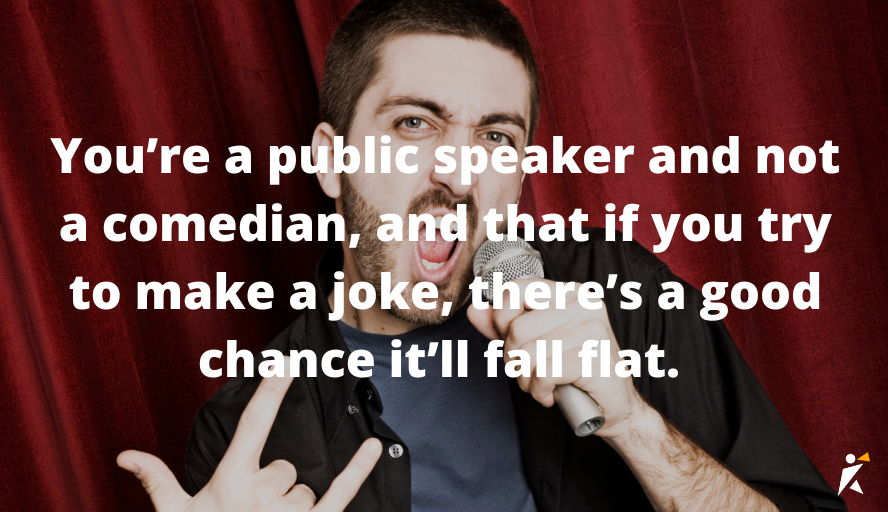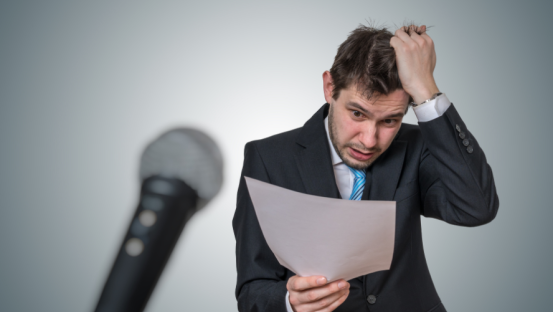How to Deal With Hecklers as a Public Speaker

Hecklers are an occupational hazard when you’re a public speaker. As much as we’d like to think that our audience will always sit politely, paying attention to what we’re talking about and taking notes, that’s not always the case.
If you’ve not come across the term before, a heckler is someone who interrupts a presentation, often by shouting things at the speaker. There are also passive hecklers, like the people who disrupt your talk by having a chat with a neighbor.
But how can public speakers deal with hecklers without diluting their message or causing inconvenience to the rest of the audience? It’s a question as old as public speaking itself and one that predates the term “heckler” itself. Let’s dive in and take a look.
Don’t be a comedian

When we think of hecklers, we often think about comedy shows and the devastating ways that comedians put down hecklers in their audience by turning the joke on them. As tempting as it can be, it’s important to remember that you’re a public speaker and not a comedian, and that if you try to make a joke, there’s a good chance it’ll fall flat. When that happens, the best case scenario is that it’ll make you look foolish. The worst case scenario is that you’ll look petty and vindictive.
Address the whole audience
It’s not always necessary for you to actually respond to a heckler, but if you decide that it’s the best thing to do then you should direct your response to the whole audience and not just the person who’s heckling you. That’s because you don’t want to inadvertently leave your audience feeling excluded, and if you respond directly to the heckler then they’ll feel entitled to keep on talking.
Manage your emotions

When someone shouts something at you in the middle of a speech that you’ve been slaving over for weeks or even months, it’s easy to let your emotions take over and to get angry or sad. The key here is to try to manage your emotions to keep them in check. The last thing you want to do is get emotional and let it come across in your speech.
Never reward them
One of the worst things that you can do with a heckler is to reward them by rising to their bait. It’s a bit like that internet adage of never feeding the trolls. If someone starts to talk over you, you can try just ignoring them and continuing with your presentation. This puts you in a position of power and shows that you’re unaffected by their words. It also makes the heckler look like the rude person that they are, and the social pressure alone is usually enough to silence them.
Be kind
Fighting fire with fire is rarely a good idea. That’s why if someone is rude or disrespectful during your speech, one of the best things that you can do is to respond with kindness rather than with anger or disdain. This can help to diffuse the situation and will also send the message that you’re in control.
Ask them to stop
This might sound like an obvious idea, but you’d be surprised at how often people forget that it’s an option and how well it can work. Like many of our other tips, this relies on the fact that social pressure can have a huge impact on people. One of the best ways to ask people to stop is to politely tell them that if they want to have a discussion with you, you’ll meet them after your talk is over.
Use the audience

This is another technique that taps into social pressure. Your audience is there because they want to hear you speak, and when someone starts shouting things out at a speaker, it wastes the audience’s time and takes away from the value that they could be receiving if you were allowed to continue. An easy way to use the audience is to turn to them and to ask them to raise their hands if they want you to continue your talk or address the point being raised.
Focus on your body language
In the same way that it’s important to keep your emotions in check when you’re dealing with a heckler, it’s also important to focus on your body language. Something as simple as the way that you stand or hold your hands can be enough to send a strong signal about the way that you’re feeling. If you retreat into yourself and display submissive body language, people will know that the heckler has got to you.
Move on
When you’re dealing with a heckler, it’s easy to get sidetracked and forget where you are in your presentation. This kind of disruption can then mean that you run out of time, and maybe forces you to gloss over part of what you were planning on delivering. Don’t let the heckler have that effect on you. Instead, commit to moving on with your presentation and don’t allow them to delay or sidetrack you.
Have them removed
This final tip is for the worst-case scenarios because asking security to remove someone can cause further disruption and also lead to your heckler holding a grudge against you. When that happens, there’s a real threat that they’ll show up again in the future and disrupt other presentations. They could also start trolling you on social media or even sending you abusive messages. You should fall back on this solution only when it’s impossible to continue with your talk otherwise, and only when you’re sure that the audience would support this action.
Conclusion
Now that you know our top tips for dealing with hecklers as a public speaker, we want to hear from you. Have you had to deal with hecklers during your career? And if so, how did you go about it?
As always, we’d love to hear your thoughts, so be sure to let us know in the comments so that we can keep the discussion going. We’d particularly love to hear from you if you have any tips that you can share with the rest of our readers.
You can also follow us on your social networking sites of choice for further updates. We’ll see you soon!






